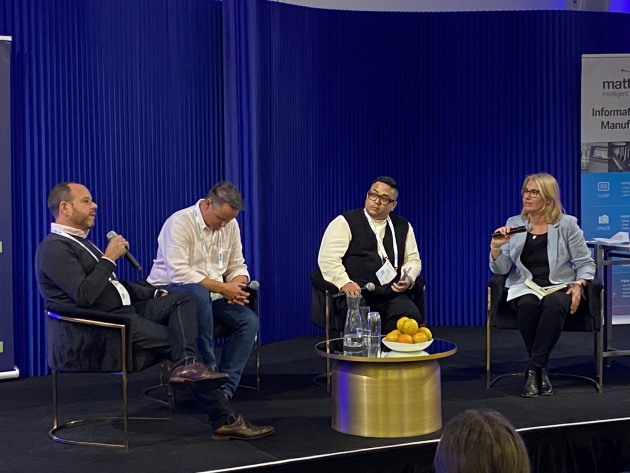In a feisty discussion about traceability and the future supply chain at the AUSPACK Leaders' Forum in Melbourne last week, PKN managing editor and publisher Lindy Hughson chaired a panel of industry specialists willing to share their insights and opinions.
David Inderias, co-founder and CEO Fresh Supply Co, and Escavox CEO Luke Wood went head-to-head on the role of traceability, trust and expectations at a B2B and consumer level.

Inderias said many had moved on from a consumer facing mindset of validating whether a product was real or not and ventured in most cases consumers don’t care.
“While it’s necessary in terms of food outbreaks, it is more about marketing and engagement. Suppliers and producers felt it was more extractive, costing them more money but not necessarily returning that value back. That's been our experience on the frontline.
“Consumers like winning stuff, but they don’t care where it came from,” Inderias said.
Wood countered, saying, “I think people inherently do care. But there is a level of consumer engagement, time, and capability to do that.”
He said often it was a case of consumers placing that care into trust, whether it be with a brand, an outlet, or a retailer. It was the sector’s efforts in building a network with the capability of conveying where the product came from, where it was going or what it was doing, that had resulted in consumers trusting the source of supply.
“Because we have invested in these systems, retailers can project that trust with confidence. Consumers might only scan a QR code for novelty or every now and then, but that is because they have learnt to trust the source of supply,” Wood said.
Working almost exclusively in the B2B arena, Wood said the focus was now on doing that better, with greater specialisation.
“There is a shift to looking for commercial opportunities, to asking ‘how do I leverage this, how do I protect me, how do I remove waste from my supply chain, how can I make my product better for you, my customer’?
“Trust is multilayered. It’s not one system or a website. It is a model and it’s learning continuously,” Wood said.
Laava joint CEO and commercial director Gavin Ger said it was important to distinguish the market being discussed, highlighting not all markets have a trusted supply chain.
Ger gave the example of a premium Tasmanian cherry exporter, whose product had a season of six weeks but was being sold for up to six months in China.
“This is a product that goes from a tree to fridge in three days and commands a premium of $200 for two kilos.
“People are paying for a lot behind that brand that signifies quality, freshness, and authenticity. If you are buying a $200 box of cherries you want to be sure of a lot of things, and we are finding in many cases people also want to know the backstory to the product,” Ger said.
“A team mantra at Lavaa is: give them a reason to scan. Telling a story is interesting up to a point, but what is becoming more popular is if they can win something, learn something new, or even receive things like awards and NFTs. But just putting a code on a box won’t get it scanned. You’ve got to give them a reason,” Ger said.
Inderias described two different channels his company is seeing – the gamification and the social accountability of traceability.
“We can see the engagement around a $100,000 give-away, and we can also see consumers engaging with companies on projects relating to carbon reduction and other sustainability goals. We’re seeing a lot more sophistication in the market and mark my words, we’re going to see sustainability eclipse the traceability aspects,” Inderias said.
Wood suggested there were two different parts of the picture, a framework and use cases with ROI. Sustainability is the first use case, with more to follow as the market matures.
He said one of the challenges for traceability was meeting the wide range of requirements across many markets.
“From the producer’s side, traceability means different things to different parts of the supply chain and the question is ‘how do even begin to eat the elephant’? There is no one right answer,” he said.
Having big retailers such as Woolworths and Coles involved was a good idea for high volume goods, but Wood said solutions for that market didn’t answer the needs of high value premium products going through non-retail channels or other markets.
Likening the introduction of a traceability framework to the introduction of the GS1 barcode in 1970, Wood said: “It is just a bunch of black lines on a product, but it is powerful because of how you use it and what you do with it. A traceability framework is critical because that is the backbone, we’re going to base this on.
“If you want to make a serious claim about your carbon credits, waste reduction, or whatever it might be, you need serious data to support that,” he said.
The challenge was how best to then use the framework given current commercial circumstances.
“Companies like Fresh Supply Co are specialising in a particular channel. We are doing the same, but in a channel where there is no single provider. We’re going to be built on the backbone of standards and standardised ways of exchanging information, then specialise and drive value through how we use that information,” Wood said.
Where the whole panel did find common ground was the importance for businesses to know what was most important to them. In determining that, they agreed, the potential of the technology is unlocked.





